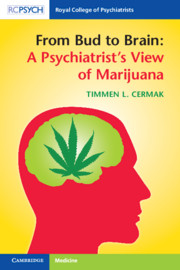Book contents
- From Bud to Brain: A Psychiatrist’s View of Marijuana
- From Bud to Brain: A Psychiatrist’s View of Marijuana
- Copyright page
- Dedication
- Contents
- Foreword
- Acknowledgments
- Introduction
- Section 1 The Science of Marijuana and the Brain
- Chapter 1 Monumental Marijuana Discoveries
- Chapter 2 Marijuana’s Acute Effects
- Chapter 3 Flies in the Ointment
- Chapter 4 Epidemiology
- Chapter 5 The Impacts of Ongoing Marijuana Use on the Brain
- Chapter 6 The Impacts of Ongoing Marijuana Use on the Mind: Section 1
- Chapter 7 The Impacts of Ongoing Marijuana Use on the Mind: Section 2
- Chapter 8 The Impacts of Ongoing Marijuana Use on Adolescent Psychology
- Chapter 9 Secondhand Marijuana: Prenatal Cannabis Exposure
- Section 2 The Science and Art of Healing
- Section 3 The History and Art of Marijuana Policy
- Section 4 Epilogue
- Index
Chapter 7 - The Impacts of Ongoing Marijuana Use on the Mind: Section 2
Emotion, Motivation, Psychosis, and Practical Impacts
from Section 1 - The Science of Marijuana and the Brain
Published online by Cambridge University Press: 31 March 2020
- From Bud to Brain: A Psychiatrist’s View of Marijuana
- From Bud to Brain: A Psychiatrist’s View of Marijuana
- Copyright page
- Dedication
- Contents
- Foreword
- Acknowledgments
- Introduction
- Section 1 The Science of Marijuana and the Brain
- Chapter 1 Monumental Marijuana Discoveries
- Chapter 2 Marijuana’s Acute Effects
- Chapter 3 Flies in the Ointment
- Chapter 4 Epidemiology
- Chapter 5 The Impacts of Ongoing Marijuana Use on the Brain
- Chapter 6 The Impacts of Ongoing Marijuana Use on the Mind: Section 1
- Chapter 7 The Impacts of Ongoing Marijuana Use on the Mind: Section 2
- Chapter 8 The Impacts of Ongoing Marijuana Use on Adolescent Psychology
- Chapter 9 Secondhand Marijuana: Prenatal Cannabis Exposure
- Section 2 The Science and Art of Healing
- Section 3 The History and Art of Marijuana Policy
- Section 4 Epilogue
- Index
Summary
Chronic marijuana use impacts an individual’s mind beyond the period of acute intoxication. Persistent downregulation of cannabinoid receptors in the amygdala, the brain’s reward circuitry and frontal cortex alters mental function in a variety of ways, including emotions, motivation and risk of psychotic illness such as schizophrenia. Gruber used a masked faces protocol to demonstrate chronic marijuana users have decreased activity in the amygdala in response to subliminal affective stimuli. She concluded that heavy marijuana users do not process emotional stimuli in the same way as non-users and this is true even when stimuli are below the level of conscious awareness. The complaints by significant others of their marijuana using partner’s emotional absence is consistent with Gruber’s findings. Individuals prone to aggression exhibit more relationship aggression during irritability caused by withdrawal. Decreased motivation over years of marijuana use is evidenced by diminished activity in the nucleus accumbens reward circuitry in response to non-marijuana stimuli. Acute psychotic episodes occur most frequently with high THC products in edible forms. Epidemiologists repeatedly find higher rates of schizophrenia in marijuana users than non-users, and higher rates of marijuana use in schizophrenics than in healthy populations.
Keywords
Information
- Type
- Chapter
- Information
- From Bud to Brain: A Psychiatrist's View of Marijuana , pp. 97 - 112Publisher: Cambridge University PressPrint publication year: 2020
